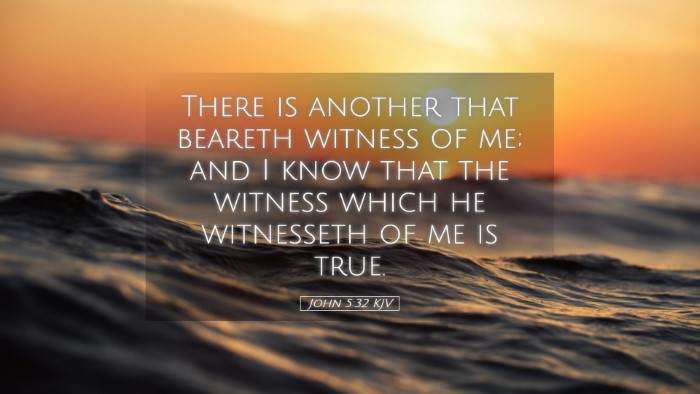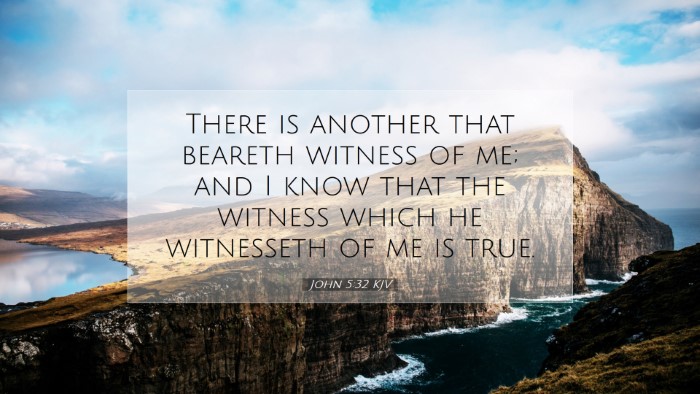Commentary on John 5:32
John 5:32 states: "There is another that beareth witness of me; and I know that the witness which he witnesseth of me is true." This verse is part of a larger discourse where Jesus defends His authority and declares the validity of His mission as the Messiah. This commentary synthesizes insights from notable public domain scholars like Matthew Henry, Albert Barnes, and Adam Clarke.
Contextual Analysis
In the preceding verses, Jesus has been discussing His relationship with the Father, indicating that His works reflect the divine authority of God. The context is essential to fully grasp the significance of the "another" mentioned in this verse.
Matthew Henry's Insights
Matthew Henry highlights the concept of witness in relation to Jesus' ministry. He explains that Jesus, while coming forth as a divine messenger, also acknowledges the testimony of others that confirm His identity and mission. Henry notes:
- "Christ relies on the testimony of the Father."
- "His witnesses are credible and bear witness to His divine origin."
This reflects the theological principle that Christ's authority is not self-derived but accredited by essential divine confirmation.
Albert Barnes' Explanation
Albert Barnes elaborates on the term "another" and clarifies that it likely references the Father. He points out that Jesus does not testify of Himself independently; rather, He states:
- "The witness of the Father is clear and authoritative."
- "The witness bears testimony to the truth of Jesus' identity as the Son of God."
According to Barnes, this dependence on the Father's testimony is crucial for understanding Jesus' humble approach to His ministry: He seeks glory for the Father, not for Himself.
Adam Clarke's Perspective
Adam Clarke emphasizes the reliability of the witness Jesus refers to. Clarke proposes that this "another" could also symbolize the witness of the Scriptures, the works of Jesus, and the prophetic declarations about Him. He outlines three prominent witnesses:
- The Father
- The works that Jesus performed
- The Scriptures which testify of Him
Clarke argues that the validation of Christ’s ministry encompasses a triad of testimonies, all converging to underline His divine authority.
Theological Implications
When Jesus refers to "another" who bears witness of Him, it invites a discussion on the nature of divine revelation and the corroborative nature of God's input into human understanding. The implication here suggests collective revelation rather than isolated spiritual experiences.
Christ's Dual Nature
The duality of Christ's nature—both divine and human—is critical for interpreting this verse. Jesus, being fully God, does not require external validation; yet, in His role as a servant and Messiah, He adheres to the necessary protocols of witness established by God's nature. Henry remarks:
"The more we seek to understand Christ, the more we see the depth of His humility in both His life and ministry."
Application for Believers
The implications of this verse stretch into the realm of epistemology for believers. If Christ is validated by multiple witnesses, it challenges modern Christians to:
- Examine the constancy of the witness in Scripture.
- Recognize the importance of community and fellowship.
- Invest in the assurance that the witness of the Holy Spirit continues to affirm the truth of Jesus today.
Conclusion
John 5:32 serves not only as a testament to Jesus' authority but also as an invitation for deeper engagement with the testimony of the Scriptures and the Holy Spirit in contemporary faith practice. Understanding this verse through the insights of Matthew Henry, Albert Barnes, and Adam Clarke enriches both the theological depth and practical application for pastors, students, theologians, and scholars alike.


